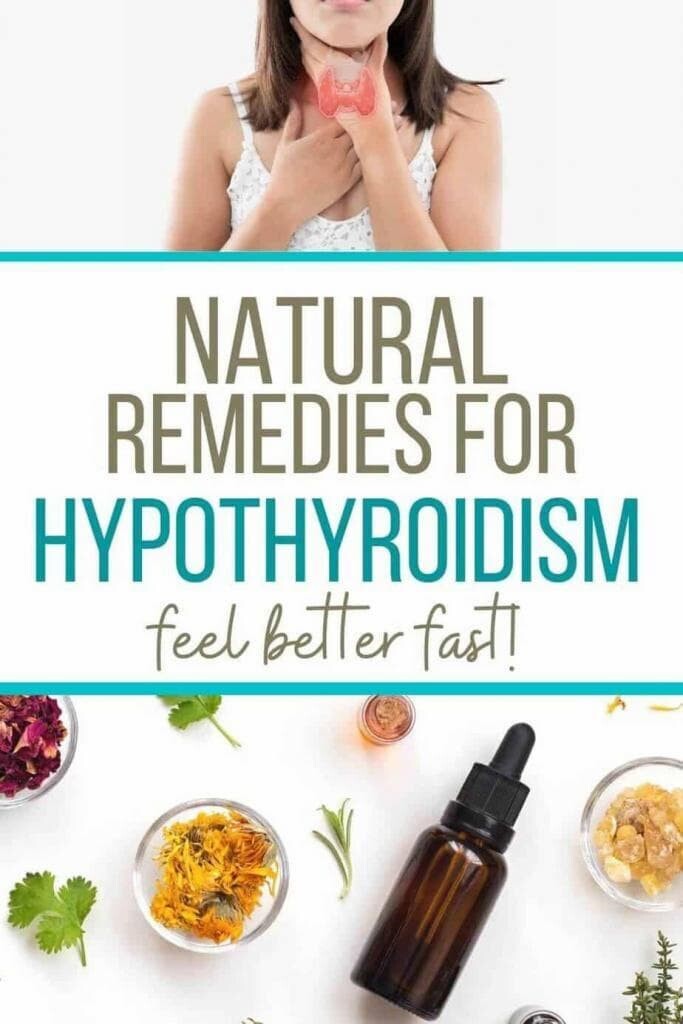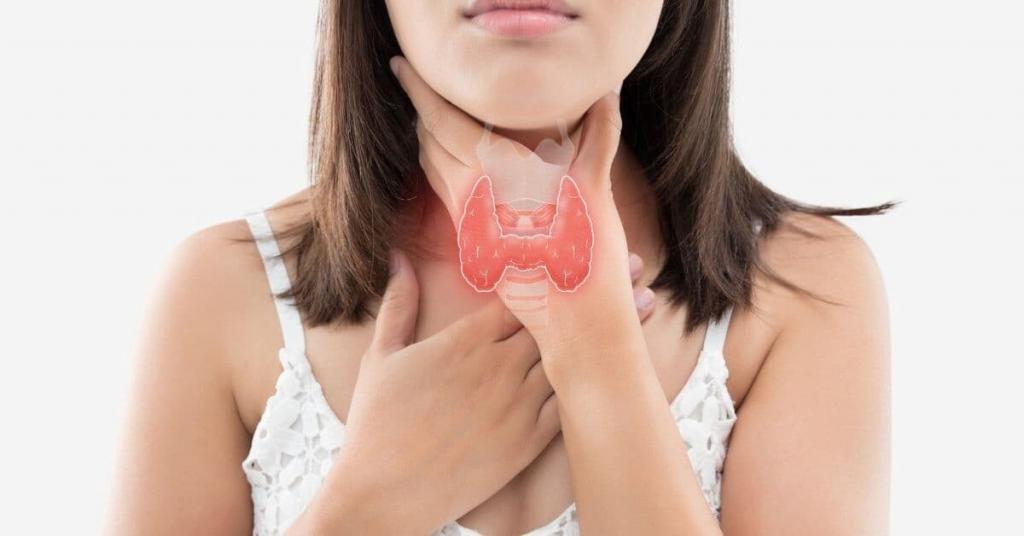Did you know that 1 in 8 women will develop a thyroid issue? And the sad part is that many go undiagnosed or improperly treated. While some may require medication, there are great natural remedies for hypothyroidism and helpful lifestyle tips that can help you feel more energy, less fatigue, so you can live a healthy and happy life.
In this article:
- Natural remedies for hypothyroidism
- Other important vitamins and minerals
- Common symptoms of hypothyroidism
- Important tests to consider
- Best and worst foods for low thyroid
- Where to find help
- Conclusion and helpful tips
Ready to find the best natural remedies for hypothyroidism, the must-have tests to help you get a complete picture, and tips to have a balanced, healthy life?
Let’s get to it!
Listen to this blog post!
Natural Remedies For Hypothyroidism
Many people wonder if hypothyroidism can be treated naturally, and the answer is, possibly.
Women, and the health issues they face, are far too complex to give a blanket answer (and I would never make such a statement since I am not a doctor).
There are, however, a number of natural remedies, lifestyle changes, and treatment options for those who develop thyroid conditions that have been used by many to reverse hypothyroidism or to lessen symptoms.
Let’s take a look at a few commonly suggested natural remedies for women with hypothyroidism.
This post may contain affiliate links, which means I’ll receive a commission if you purchase through my links, at no extra cost to you. Please read full disclosure for more information.
Ashwagandha
Ashwagandha is a great natural remedy for hypothyroidism because it can help balance T4 levels, lower cortisol, and is a known adaptogenic herb, meaning that it can also help your body during times of stress.
Cod Liver Oil
Cod Liver Oil is a great way to get essential fatty acids when you don’t eat a lot of fish. Cod liver oil is high in omega-3 fatty acids, has been found to help lower inflammation, reduce oxidative stress, stabilize adrenal function, feed the brain, help with good gut health, and so much more!
Desiccated Liver
Liver is one of the most nutrient-dense foods available! It is a great source of A, B, & D vitamins, iron, zinc, protein, and amino acids. All of these make this superfood a great addition to your diet since these vitamins, minerals, and protein are necessary for a proper functioning thyroid. Not a fan of eating liver? Try desiccated liver capsules!
Other Important Vitamins & Minerals For Hypothyroidism
When discussing natural remedies for hypothyroidism it’s important to include vitamins and minerals like selenium, iodine, and zinc.
These are essential to a proper functioning thyroid but supplements aren’t always the best option (although that is dependent on each person’s individual situation and health care provider’s recommendations 😉 ).
So where can you find these essential nutrients if not in supplement form?
Food!
Selenium
The body takes the mineral selenium and turns it into glutathione. Glutathione is an incredible antioxidant that can help protect the thyroid from inflammation and oxidative stress. Selenium is also needed for the production of T3.
Great sources of selenium include:
- brazil nuts
- oysters
- beef
- chicken
- mushrooms
Not getting enough selenium from food? This supplement is a food-based option you could look into.
*Be aware– for some, it is possible that selenium can negatively affect thyroid function if you have low iodine levels.
Iodine
Iodine is an essential nutrient and since the body does not make its own, we have to get it from our diet (or supplementation). If there is not enough iodine, the body cannot produce thyroid hormones properly.
If you’re thinking of adding iodine to naturally boost thyroid function, be sure to add foods like:
- fish
- seaweed/sea vegetables (kelp, dulse, nori)
- shellfish
- eggs
- dairy products
Not getting enough iodine through diet alone? Check out this food-based supplement.
*Be cautious– even though iodine is essential, some people do not do well with supplementation.
Zinc
Zinc has been shown to have a positive effect on the thyroid by supporting and improving function.
Did you find that your zinc levels are low?
Here are foods to include:
- oysters
- beef
- chicken
- hemp seeds
- oatmeal
Not getting enough zinc? See if this food-based supplement would be appropriate for you.
Symptoms Of Hypothyroidism
If you’re experiencing any of the following symptoms, it’s possible you have a thyroid condition and may want to consider additional testing:
- fatigue
- weight gain
- constipation
- cold hands and feet
- hair loss
- heavy menstrual periods
- aches and pains
- anxiety
- insomnia
- depression
- brain fog
- joint pain
- adrenal fatigue
- hormone imbalance
- muscle weakness
- higher than normal cholesterol levels
This is not an exhaustive list as there are many more symptoms that can be experienced with hypothyroidism. If you find yourself struggling with any of these please consider getting the appropriate testing.
Important Tests
If you’ve looked over the symptoms and feel like you want to try natural remedies for hypothyroidism to help you feel better, be sure to take the first step and get the appropriate tests first!
Which tests should you consider?
A talk with your health care provider would definitely be in order to help you determine the best tests for your particular situation, but if your doctor won’t order tests or you are a DIY kind of person, here is a list of thyroid-related tests that I have personally found to be helpful.
- Full panel thyroid test– this includes TSH along with T3, T4, antibody tests and more
- Hormone and adrenal test– a urine test that measures cortisol patterns along with other sex and adrenal hormone levels
- HTMA (Hair Tissue Mineral Analysis)- find your mineral levels so you can bring your body into balance
There are other tests that you may want to include as well such as a full iron panel, a complete blood count (CBC), or a comprehensive metabolic panel. But again, this would be something to discuss with a health care practitioner or research further.
Best And Worst Foods For Hypothyroidism
The subject of food was mentioned briefly in the supplement section but I thought it might be a good idea to go over the topic in a little more depth.
If you’ve been diagnosed with hypothyroidism and are looking for natural remedies, diet cannot be overlooked.
Let’s start with the best foods and then move on to the worst.
Best Foods For Hypothyroidism
Here are a few foods that will help feed and nourish your body (and thyroid!):
- Seaweeds– kelp, dulse, and nori are all great examples and full of iodine. You can find them in flakes, wraps, and capsules which makes including them in your diet simple and easy.
- Fermented foods– traditionally made sauerkraut, kimchi, veggies, or kefir are great examples of probiotic-rich fermented foods that can help balance your gut microbiome, lessen inflammation, and help digestion.
- Bone broth– contains amino acids, collagen, and nutrients that can help repair the digestive lining and provide important minerals for optimal health.
- Fresh fruits and vegetables-nutrient dense foods that contain important vitamins, minerals, and antioxidants. This good group should make up a large portion of your daily diet.
- Filtered water– chlorine, fluoride, and other chemicals can wreak havoc on the thyroid (and the body in general). Make sure the water you’re drinking is clean and filtered!
Other healthy foods to consider adding to your diet would be:
High-quality meats (grass-fed, organic), wild-caught seafood, sprouts, ghee, avocados, eggs (if tolerated), berries, properly prepared beans, and nuts (if tolerated).
Worst Foods For Hypothyroidism
Here are a few examples of foods that you may want to exclude, at least for a time, if you have symptoms of low thyroid:
- Sugar– because sugar feeds bad bacteria, contributes to weight gain, causes blood sugar issues, and can disrupt hormone levels, it’s best to severely limit or eliminate it.
- Gluten– gluten is difficult for many to tolerate, but those with hypothyroidism are especially vulnerable. Gluten contributes to inflammation, nutrient deficiencies, gut problems, and even skin issues.
- Refined carbohydrates– products that contain refined carbs are often made with gluten, sugar, and other less than healthy ingredients. Skip the cereal, bread, and pasta and opt for healthier carbs like sweet potatoes, squash, or fruit instead.
- Alternative sweeteners and sugar substitutes– these products have been linked to weight gain, obesity, heart disease, and even cancer. Not healthy for your thyroid or your body in general!
- Alcohol– not only does alcohol negatively affect blood sugar, along with gut and brain health, it can also negatively affect thyroid function by lowering thyroid hormone levels, blocking their activity, and even destroying thyroid cells.
Other foods to consider removing from your diet:
Raw goitrogenic foods, nightshades, vegetable oils, coffee, unfiltered tap water, and conventional dairy products.
When it comes to diet, please keep in mind that these are general recommendations. There is no one-size-fits-all diet that is perfect for every person in every situation.
I encourage you to consider all recommendations and then make the choices that are best for you 🙂
Where To Find Help
Feeling like this journey is a little overwhelming? Or maybe you need expert help from a health care practitioner that is knowledgeable and experienced in thyroid issues and women’s health care?
That’s totally understandable! We all need help and guidance from time to time.
While there are many great doctors and health care professionals out there, sadly, many are not as knowledgeable as you need them to be in the area of proper thyroid care. (Including many endocrinologists 🙁 )
Personally, I have found the most help with practitioners that practice integrative or functional medicine.
To find a practitioner in your area you can start by checking out these helpful websites:
The Institute For Functional Medicine
American Association Of Naturopathic Physicians
American College For Advancement In Medicine
You could also do a google search, ask for recommendations in online groups, talk to your chiropractor, or talk with friends, co-workers, and neighbors, and see who they would recommend. Chances are if you ask around you will find a woman (or many!) that has dealt with a thyroid issue and may have suggestions.
Can’t find a practitioner in your area?
Look into virtual appointments!
SteadyMD is a great example of a telemedicine option.
Or, you could check out these Top 50 Functional And Integrative Medical Doctors, a few mention that they offer virtual consultations.
Conclusion & Helpful Tips
Finding out that you have hypothyroidism can be both overwhelming and a relief.
There is a lot to learn, but on the other hand, at least you know what is causing the symptoms that you have been experiencing.
Once you have confirmed your diagnosis, you can then move on to finding an appropriate treatment that may include the best natural remedies for hypothyroidism. Then you can start making the diet lifestyle changes that will be best for your thyroid and overall health.
In addition to the steps listed above, here are a few tips to help you support your health and good thyroid function:
- Reduce stress– meditation, prayer, journaling, yoga, and deep breathing are easy ways to reduce stress naturally.
- Get enough restful sleep– this can be difficult when dealing with a health issue or stress, but the body needs good quality sleep each night to rest and repair. Need a few tips? Here are 18 Natural Insomnia Remedies (+Helpful Sleep Tips!)
- Don’t forget your adrenals– The thyroid and adrenals (along with other hormones) work hand-in-hand, so don’t forget to give them a little love and support too!
Here are a few posts to help you support your adrenals 🙂
Dealing with hypothyroidism isn’t always easy, but with proper testing, a helpful practitioner, a nourishing diet, and natural remedies to boost and support your thyroid function, you can find health and happiness again!
Have you dealt with thyroid issues? Do you have a favorite natural remedy for hypothyroidism? I would love to hear your story, tips, or suggestions! Feel free to leave a comment or send me a message 😉
Resources:
The National Center for Biotechnology Information


